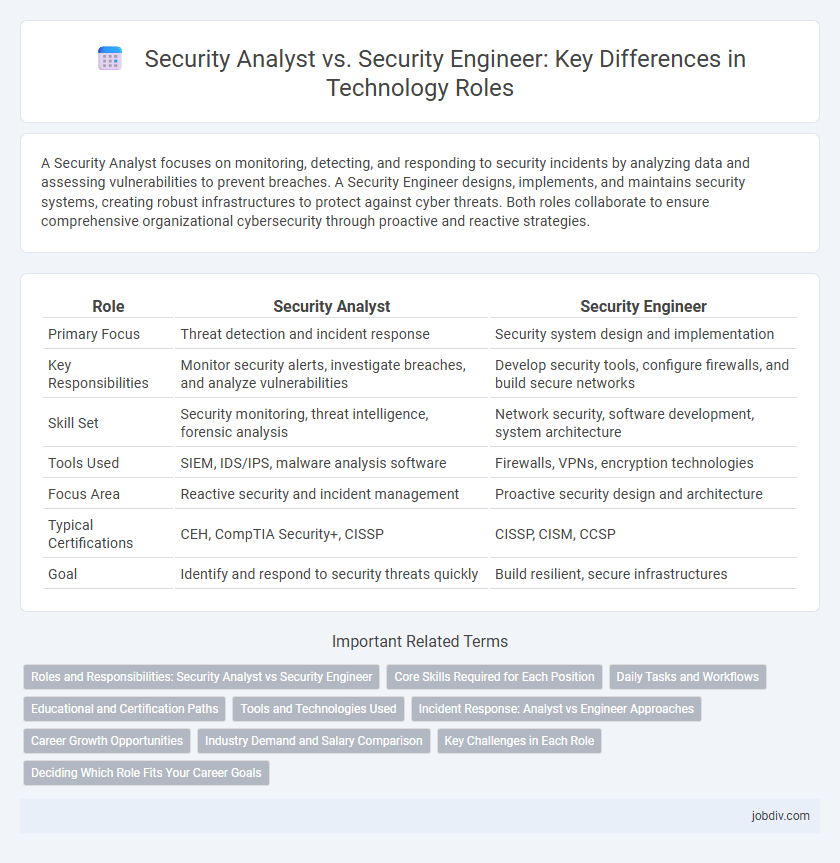A Security Analyst focuses on monitoring, detecting, and responding to security incidents by analyzing data and assessing vulnerabilities to prevent breaches. A Security Engineer designs, implements, and maintains security systems, creating robust infrastructures to protect against cyber threats. Both roles collaborate to ensure comprehensive organizational cybersecurity through proactive and reactive strategies.
Table of Comparison
| Role | Security Analyst | Security Engineer |
|---|---|---|
| Primary Focus | Threat detection and incident response | Security system design and implementation |
| Key Responsibilities | Monitor security alerts, investigate breaches, and analyze vulnerabilities | Develop security tools, configure firewalls, and build secure networks |
| Skill Set | Security monitoring, threat intelligence, forensic analysis | Network security, software development, system architecture |
| Tools Used | SIEM, IDS/IPS, malware analysis software | Firewalls, VPNs, encryption technologies |
| Focus Area | Reactive security and incident management | Proactive security design and architecture |
| Typical Certifications | CEH, CompTIA Security+, CISSP | CISSP, CISM, CCSP |
| Goal | Identify and respond to security threats quickly | Build resilient, secure infrastructures |
Roles and Responsibilities: Security Analyst vs Security Engineer
Security Analysts focus on monitoring networks, identifying vulnerabilities, and responding to security incidents to protect organizational assets. Security Engineers design, implement, and maintain security systems, developing infrastructure to prevent cyber threats proactively. Both roles require collaboration to ensure comprehensive cybersecurity through threat detection, risk assessment, and system fortification.
Core Skills Required for Each Position
Security analysts require strong skills in threat detection, risk assessment, and incident response to identify vulnerabilities and protect organizational assets. Security engineers must possess expertise in designing, implementing, and maintaining security infrastructure, including firewalls, intrusion detection systems, and encryption protocols. Both roles demand proficiency in cybersecurity tools, scripting languages, and an in-depth understanding of network architectures and security frameworks such as NIST and ISO 27001.
Daily Tasks and Workflows
Security Analysts monitor network traffic, analyze security incidents, and conduct vulnerability assessments to identify potential threats and ensure compliance with security policies. Security Engineers design, implement, and maintain security architecture, develop automated security solutions, and respond to breaches by applying patches and updates. Both roles collaborate closely to enhance organizational cybersecurity through continuous risk assessment and proactive defense strategies.
Educational and Certification Paths
Security Analysts typically pursue degrees in cybersecurity, information technology, or computer science, often complemented by certifications such as CompTIA Security+, CISSP, or Certified Ethical Hacker (CEH). Security Engineers usually require a stronger foundation in software development or network engineering, with advanced certifications like Cisco Certified Network Professional (CCNP), Certified Information Systems Security Professional (CISSP), or Offensive Security Certified Professional (OSCP). Both roles benefit from continuous education through specialized courses and practical experience in threat detection, vulnerability assessment, and system architecture security.
Tools and Technologies Used
Security Analysts primarily utilize threat detection platforms, Security Information and Event Management (SIEM) tools like Splunk and QRadar, and vulnerability assessment software to monitor and analyze potential security breaches. Security Engineers focus on designing and implementing security infrastructures using firewalls, intrusion prevention systems (IPS), encryption protocols, and automated security tools such as Palo Alto Networks and Cisco Secure solutions. Both roles require expertise in endpoint protection, network security technologies, and continuous monitoring systems to safeguard organizational assets effectively.
Incident Response: Analyst vs Engineer Approaches
Security Analysts focus on monitoring, detecting, and responding to security incidents by analyzing alerts, conducting forensic investigations, and coordinating containment efforts. Security Engineers, on the other hand, design and implement proactive security measures such as intrusion detection systems, automated response tools, and incident response playbooks to prevent and mitigate breaches. Both roles collaborate to strengthen organizational resilience by combining real-time incident management with robust security infrastructure development.
Career Growth Opportunities
Security analysts specialize in monitoring and responding to cybersecurity threats, offering growth paths toward senior analyst and incident response leadership roles, while security engineers design and implement security architectures with opportunities to advance into security architect and engineering management positions. Both roles demand continuous skill enhancement in areas like threat intelligence, cloud security, and compliance frameworks, which are critical for career progression. Mastery in automation tools, risk assessment methodologies, and emerging technologies such as AI-driven security solutions significantly enhances employability and promotion prospects for professionals in both domains.
Industry Demand and Salary Comparison
Security Analysts and Security Engineers both play crucial roles in cybersecurity, but Security Engineers typically command higher salaries due to their advanced technical expertise and responsibilities in designing and implementing security systems. Industry demand for Security Analysts remains strong, driven by the need for continuous monitoring and threat assessment, while Security Engineers are increasingly sought after for their skills in building robust defense architectures. According to recent industry reports, the average salary for Security Engineers ranges from $95,000 to $140,000 annually, compared to $75,000 to $110,000 for Security Analysts, reflecting differences in complexity and strategic impact.
Key Challenges in Each Role
Security Analysts face key challenges such as continuous monitoring of threats, incident response coordination, and ensuring compliance with evolving cybersecurity regulations. Security Engineers encounter difficulties in designing and implementing robust security architectures, integrating advanced security tools, and maintaining secure network infrastructure against sophisticated cyber attacks. Both roles require strong expertise in threat intelligence, vulnerability management, and proactive risk mitigation strategies.
Deciding Which Role Fits Your Career Goals
Security analysts focus on monitoring and responding to threats, analyzing security incidents, and ensuring compliance with cybersecurity policies. Security engineers design, build, and maintain secure infrastructure and implement advanced defense systems to prevent breaches. Choosing between these roles depends on whether you prefer reactive analysis and forensic investigation or proactive system design and engineering in your technology career.
Security Analyst vs Security Engineer Infographic

 jobdiv.com
jobdiv.com